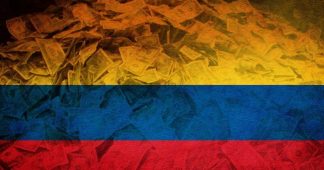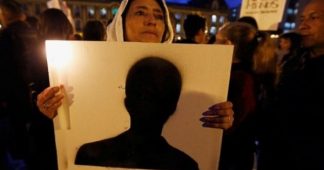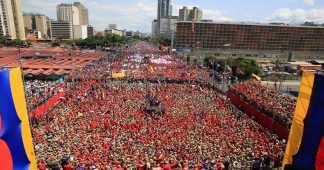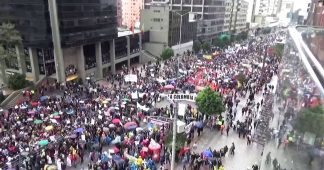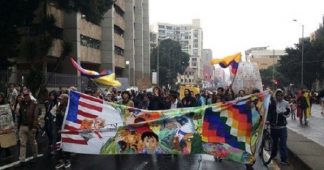In a civil lawsuit, the court found that the paramilitaries operated in a “symbiotic relationship” with U.S.-funded Colombian forces.
By Alice Speri
Carlos Mario Jiménez Naranjo, a Colombian paramilitary commander best known as “Macaco,” was responsible for the massacre of hundreds of people between the late 1980s and 2005, when Colombia’s right-wing paramilitaries and government forces alike fought a brutal war against left-wing guerillas and the civilians suspected of sympathizing with them.
Macaco led a group called the Bloque Central Bolívar in Colombia’s Middle Magdalena region; the BCB was dubbed“a killing machine” by another paramilitary commander. Its members murdered upward of 1,300 men, women, and children — a figure Macaco himself admitted to but is widely believed to be a conservative estimate. In the late 1990s, a number of paramilitary groups came together under the banner of the United Self-Defense Forces of Colombia, or AUC in Spanish, a now-disbanded formation that the U.S. and several other governments listed as a terrorist organization. Macaco’s BCB forces made up the group’s largest and most violent unit.
In 2005, Colombia’s paramilitary groups laid down their arms as part of a justice and peace process that promised militant leaders sentences of no more than eight years in exchange for a full account and admission of responsibility for their crimes. Through that process, paramilitary commanders began to speak about their deep connections to Colombia’s military and political classes, implicating leading figures in the government of then-President Álvaro Uribe, a close ally of the United States. In 2008, the U.S. requested the extradition of Macaco and several dozen paramilitary leaders — relieving Uribe of uncomfortable revelations about the interdependence of the Colombian state and the paramilitaries, a relationship which the U.S. itself had enabled to the tune of billions of dollars in security assistance. (Macaco himself had benefited from U.S. support even more directly, as a palm oil company he owned had received funding from the U.S. Agency for International Development.)
While the atrocities committed by Colombian paramilitaries were well documented, the U.S. Department of Justice prosecuted those leaders over narcotrafficking charges exclusively — cutting short a Colombian effort to get tens of thousands of victims and their families a full accounting of the paramilitaries’ abuses. Macaco was convicted on drug trafficking charges and sentenced to 33 years in federal prison. His sentence was reduced in exchange for collaborating with U.S. prosecutors, and Macaco was released after 11 years and deported back to Colombia in 2019. While he continues to face murder and conspiracy charges in Colombia, he has not yet been found criminally responsible for any of the hundreds of murders he oversaw.
Macaco’s victims, many of whom have continued to push for an official recognition of his crimes, found a first glimmer of accountability earlier this fall: not in Colombia but in the U.S., where a Florida federal judge ruled against Macaco in a civil case filed on behalf of the family of one of his victims. Eduardo Estrada was a popular community leader and founder of an independent radio station whom paramilitary leaders ordered executed in the town of San Pablo in 2001. Once he was back in Colombia, Macaco halted contact with his U.S. attorneys, essentially dropping out of the case. The court awarded $12 million in damages to Estrada’s family, though they will likely never be able to collect the money.
Hugo Rodriguez, an attorney who last represented Macaco in 2015, told The Intercept that he had “serious doubt” a jury would have ruled against his former client. A different attorney who represented Macaco more recently did not respond to a request for comment.
“These cases are rarely about the actual collecting,” Claret Vargas, one of the attorneys who represented Estrada’s family, told The Intercept. “Often times they are about establishing a historical proof and about getting to confront the defendant with what they did. The idea is that the ruling itself is a form of reparation.”
The ruling is nonetheless significant in a number of other ways. It marked the first time a court in any country held Macaco responsible for one of the hundreds of murders carried out by the BCB. It was also the first judgment for murder and torture against a Colombian paramilitary leader in a case of its kind in the United States.
Perhaps most significantly, the ruling recognized a “symbiotic relationship” between the paramilitaries and the Colombian state. While such a relationship is hardly a secret in Colombia, it was the first time a U.S. court recognized it.
“A U.S. court has found that these violent, murderous, paramilitary regimes were basically the same as the Colombian government,” Daniel McLaughlin, another attorney who litigated the case, told The Intercept. “Which is the Colombian government that the U.S. was supporting at the time.”
Gustavo Gallón, the director of the Colombian Commission of Jurists, noted that the U.S. decision, even though it is a civil rather than criminal one, was a landmark moment in the push for accountability for the paramilitaries’ crimes. The commission had strenuously fought against Macaco and other paramilitary leaders’ extradition to the U.S., seeking the intervention of the International Criminal Court and of the Inter-American Commission on Human Rights, as well as lobbying senior U.S. officials to no avail.
“This is the first time we have got a decision in the United States about these people, and it is very important that judicial authorities in the United States have declared Macaco’s responsibility,” Gallón, who represents Estrada and other victims’ families in Colombia, told The Intercept. “There has been an important responsibility of the United States in the creation of paramilitary groups.”
A spokesperson for the U.S. Department of Justice said that the extraditions “assisted Colombia in severing paramilitary leaders from their power base.” The spokesperson also noted that some of the extradited men continued to participate in Colombia’s justice and peace process through virtual appearances from the U.S. “To the extent Macaco did not cooperate, that would have been his choice, not as a result of extradition,” the spokesperson said, adding: “The Department of Justice was instrumental in ensuring Macaco returned to Colombia.”
A spokesperson for the Colombian Embassy in the U.S. declined to comment.
A Symbiotic Relationship
The civil case against Macaco was filed in the U.S. by the Center for Justice and Accountability, or CJA, a group that helps victims of human rights abuses worldwide seek justice in court. The decadelong litigation was filed under the Torture Victim Protection Act, U.S. legislation passed in the early 1990s that grants both U.S. citizens and foreigners the right to bring civil claims over torture and extrajudicial killings committed anywhere in the world as long as the perpetrators are under U.S. jurisdiction, as was the case when Macaco was in U.S. custody.
The case against him hinged on a particular interpretation of the law that stipulates the crimes must have been committed “under actual or apparent authority, or color of law, of any foreign nation.” That requirement has traditionally excluded victims of paramilitaries and other nonstate actors, but the judge in Macaco’s case concluded that there was an “abundance of evidence” the BCB had operated in conjunction and coordination with the Colombian state.
The case could set a precedent for more civil litigation against paramilitaries and other nonstate actors to be filed in the United States, as well as impact ongoing cases. “Our case was pushing the limits of the state action requirement to say, ‘Paramilitaries that are operating in this symbiotic relationship with the state qualify as state actors,” said McLaughlin. “You could imagine other contexts where governments are using paramilitary groups to kind of do their dirty work.”
According to testimony presented to the court, the BCB’s first foray into San Pablo, Eduardo Estrada’s town, came in 1999, when the group massacred 14 civilians as state security forces, whom the paramilitaries had warned in advance of the attack, stood down. In the following years, the ties between official forces and the paramilitary group were on stark display: Police and the military provided information about suspected guerrillas to the BCB, who proceeded to target and kill them; the military sold weapons to the BCB, and police took bribes from the group in exchange for not investigating killings they had committed. Members of the BCB detailed those relationships at length in testimony they gave Colombian prosecutors as part of the justice and peace process.
The Colombian military and police received funding and training from the United States as they operated closely with paramilitary groups in their fight against left-wing guerrillas and quest for control of vast swaths of the country. That support was part of a $10 billion U.S. investment into what is known as “Plan Colombia,” a counternarcotics program that profoundly transformed the Colombian security landscape and effectively enabled the government-allied paramilitaries to flourish. For years, U.S. officials raised concerns internally that the Colombian government seemed to have little interest in curbing paramilitary violence and, in multiple occasions, appeared to promote it instead. But despite the warnings, the U.S. government continued to fund Colombian security forces.
A spokesperson for the U.S. Department of State wrote in an email to The Intercept that “support through Plan Colombia has helped Colombia become a law enforcement leader in the region, to the point where Colombia now provides training and capacity building exercises to many other countries.”
In 2005, the umbrella paramilitary organization known as AUC disbanded. Its members let go of their weapons and embarked on a reintegration process that included a transitional justice initiative. When Macaco’s BCB, which had more than 7,000 members, disarmed, they handed over more than 5,000 firearms and 2,000 grenades, as well as four-wheel vehicles, motorcycles, aircraft, and boats. (Macaco, as the group’s general commander, oversaw the demobilization in military attire, court documents note.)
A year later, what became known as the “parapolitics scandal” rocked Colombia, exposing the deep ties between scores of the country’s politicians and the AUC. As the transitional justice process went underway, some of the demobilized paramilitaries — though not Macaco — began to speak about their ties to the military and to members of Colombia’s business and political elites.
“They spoke clearly about what they had done, and their justifications for their crimes, and their political project, because they thought that the AUC was a political project, that they were trying to protect the property and the security of places around the country against guerrilla attacks,” said Daniel Marín López, a transitional justice researcher and adviser to Colombia’s Truth Commission, which was established as part of the 2016 peace agreement between the Colombian government and the Revolutionary Armed Forces of Colombia, or FARC, the largest left-wing guerrilla group in the country.
“That’s why they extradited them,” Marín López told The Intercept. “Because these commanders were starting to talk to the prosecutors, and for the political establishment it wasn’t a good idea to have these people talking. … They were talking too much, and the government didn’t want to have this kind of truth being released.”
The commanders’ revelations were a profound embarrassment not only to the Uribe government, but also to the U.S., where long-standing support for the Colombian government came under scrutiny.
“There was tremendous pressure on Uribe’s government to show that he had no links to the paramilitaries,” said Gimena Sánchez-Garzoli, director for the Andes region at the Washington Office for Latin America, a U.S.-based group that advocates for human rights in the region. “And so what did he do? He extradited all the Self-Defense Forces paramilitary commanders to the United States, including Macaco. He got rid of the heads of these groups.”
In May 2008, in the middle of the night to avoid the intervention of Colombia’s Supreme Court, the men were picked up from jails across the country and flown to the United States.
Whitewashing Paramilitarism
The extraditions dealt a huge blow to Colombia’s nascent transitional justice process.
“It was a catastrophe for Colombia’s peace and accountability,” Vargas, the attorney, told The Intercept.
Because U.S. prosecutors had agreed to extradite the paramilitary leaders on drug-related charges only, they could not prosecute them for other crimes, and the paramilitaries’ victims were largely excluded from proceedings in the U.S.
“The U.S. government had a choice to not ignore the victims — it wasn’t unknown to them that these people were responsible for atrocities and not just drug trafficking offenses,” Vargas said. “What the victims want is to know: If their loved ones have disappeared, where are they? Or if they were found or killed, what happened to them? And if they know what happened to them, they want to know why. And they never got access to that information.”
Extradition requests, particularly over narcotrafficking charges, have long been a staple of the U.S. war on drugs and have occasionally resulted in diplomatic disputes with foreign governments, including, recently, Mexico. The Colombian paramilitaries’ extradition was unique, however, because there was a truth and justice process underway, and there was widespread opposition to the prospect of the U.S. whisking the perpetrators away. “This case was literally about thousands of killings, including multiple massacres,” said McLaughlin, the attorney. “The victims had already given up so much: All [the paramilitary commanders] could get was at most eight years in prison — as long as they told the truth.”
That moment of truth never came, and for the most part, there was no mention of the paramilitaries’ crimes during their legal proceedings in the United States. U.S. prosecutors did not consider hundreds of slain Colombians to be victims of drug conspiracies, said Roxanna Altholz, a human rights attorney who fought for years to have the testimonies of the families of victims included in U.S. criminal proceedings against paramilitary leaders.
The Justice Department “tried very high-level state and cartel officials for drug conspiracies, and those prosecutions have absolutely failed in holding those individuals accountable for the violence they perpetrated in their countries of origin, and that is a horrendous omission,” Altholz, who authored a detailed report about the extraditions, told The Intercept. Individuals responsible for hundreds of murders were tried in the U.S. “for pounds and ounces,” she added. “That’s an enormous disservice to the victims and their families in Colombia. It’s a denial of the value of their lives.”
After a seven-year legal battle, Altholz managed to get the family of Julio Henríquez Santamaría, another Colombian community activist slain by the paramilitaries, to testify in the narcotrafficking case against the extradited leader responsible for his torture and death, Hernán Giraldo Serna. Altholz’s clients were the first foreign victims of a drug conspiracy to be recognized by a U.S. court.
Meanwhile, extradition to the U.S. became a sought-after solution for Colombians facing serious criminal charges back home — a reversal of what had long been steadfast opposition to being transferred to the U.S. to face justice. “In the 1990s, one of the main crusades of drug traffickers such as Pablo Escobar and people from the Cali Cartel was against extradition. People had this mental framework that extradition was the worst thing that could happen to you,” said Marín López, the human rights researcher. “But drug traffickers today find that extradition is the most lenient penalty they can get: Because they can make some kind of deal with the [U.S.] Justice Department, they can maintain their assets in their country, and they can have some special protection in the United States. Right now, it’s a very good deal to be extradited.”
Neither the demobilization nor the extradition of top paramilitary leaders succeeded in putting an end to Colombia’s paramilitary violence. Several units regrouped under what is known as “successor groups,” which Colombian authorities have described as bandas criminales, or criminal bands, without any reference to their connection to the interests of local political and economic elites. The U.S., whose ongoing security assistance to Colombia requires that its beneficiaries do not collude with such groups, went along with the rebranding, which essentially obscured the true nature of these groups.
“They wanted to take out the political aspect of it, and basically say, ‘These are a bunch of criminals, there’s no connection to any policy, or any ideology.’ … Like, all of a sudden, they are these random criminals. Well, they’re not,” Sánchez-Garzoli, of WOLA, told The Intercept, noting that following the demobilization, the State Department has largely stopped referring to paramilitarism in Colombia. “To put it bluntly, the U.S. whitewashed the concept that there are paramilitaries.”
Far from recognizing their own role in contributing to the problem by training and funding Colombian state forces at a time when they operated closely with the paramilitaries, U.S. officials have largely regarded Plan Colombia as a successful initiative to be replicated elsewhere, noted Sánchez-Garzoli.
Like Macaco, several of the paramilitary commanders extradited to the U.S. have completed the reduced sentences they won through plea deals with the Justice Department. While some have returned to Colombia, others have built new lives in the U.S. As of last year, Colombian officials did not know the status of at least eight paramilitary leaders extradited to the U.S., according to local reports.
“What happened in Colombia is certainly the responsibility of Colombian leaders and society,” said Altholz. “But also of the United States. Anywhere you look, you’ll see the United States.”
Published at theintercept.com
We remind our readers that publication of articles on our site does not mean that we agree with what is written. Our policy is to publish anything which we consider of interest, so as to assist our readers in forming their opinions. Sometimes we even publish articles with which we totally disagree, since we believe it is important for our readers to be informed on as wide a spectrum of views as possible.
